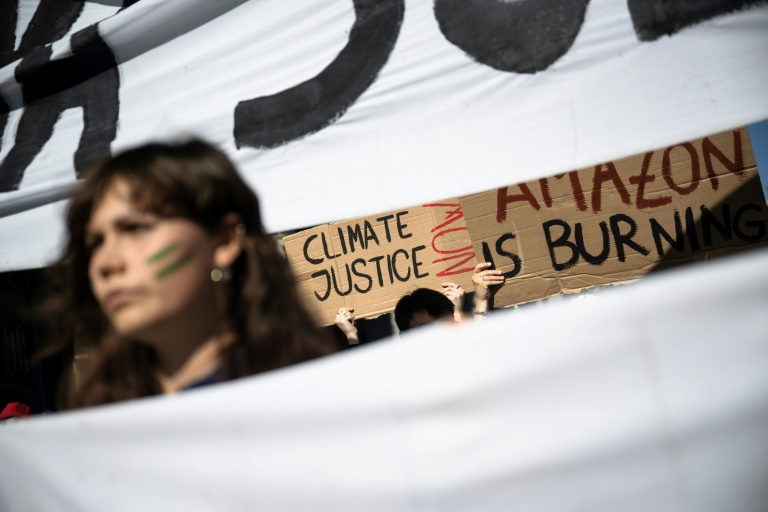G7 energy ministers have agreed a time frame for phasing out coal-fired power plants, a British minister said Monday, as the UN warned “excuses” for failing to take bold actions on climate change were “not acceptable”.
The Group of Seven meeting in Turin is the first big political session since the world pledged at the UN’s COP28 climate summit in December to transition away from coal, oil and gas.
On the first of the two days of talks, energy and ecological transition ministers from the G7 agreed to committing to a common target of shutting down coal-fired power plants, according to British Nuclear and Renewables Minister Andrew Bowie.
“We do have an agreement to phase out coal in the first half of the 2030s”, Bowie told CNBC on the sidelines in Turin, calling it “an historic agreement”.
A European source confirmed to AFP the G7 looked likely to commit to close the plants “in the first half of the 2030s”.
The latest G7 draft commits to “phase out existing unabated coal power generation in our energy systems during the first half of 2030s or in a timeline consistent with keeping a limit of 1.5?C temperature rise within reach, in line with countries’ net zero pathways”, the source said.
Asked to confirm a deal for a phase out by 2035, Italian Environment and Energy Security Minister Gilberto Pichetto Fratin said the timeline was “a hypothesis”.
“There is a technical agreement on it, but we are working on the political aspect,” he told journalists.
A French political source told AFP “we’re moving towards an ambitious agreement, in particular on the effective phase-out of coal”.
An agreement on a fixed time frame would be hailed as an important step.
UN climate chief Simon Stiell earlier Monday urged the highly industrialised countries to use their political clout, wealth and technologies to end fossil fuel use.
“It is utter nonsense to claim the G7 cannot — or should not — lead the way on bolder climate actions,” Stiell, who leads the United Nations climate change organisation, told the ministers.
The talks come as a new report by a global climate institute shows the G7 — which includes Canada, France, Germany, Italy, Japan, the UK and the US — is falling far short of its targets.
Hundreds of protesters demonstrated in Turin on Sunday, some burning photos of the G7 leaders they accuse of failing future generations.
Environmentalists want to know how the energy and environment ministers intend to follow through on pledges, such as the agreement at COP28 in Dubai to double energy efficiency rates and triple renewable capacity by 2030.
Rome, which holds the G7 rotating presidency this year, wants Turin to be “a strategic link” between last year’s UN climate talks and COP29, which will take place in November in Azerbaijan.
Italy, a climate change hotspot vulnerable to wildfires, drought and glacier retreat, is putting “biodiversity, ecosystems, warming seas” high on the agenda, according to Italian Environment and Energy Security Minister Gilberto Pichetto Fratin.
Ministers are discussing “renewables, energy efficiency, phasing out fossil fuels” as well as “research for next-generation nuclear power, fusion, the circular economy, critical raw materials, biofuels,” he said.
The G7 was expected in its final statement Tuesday to commit to reducing plastic production in order to tackle the global scourge of pollution, France’s ecological transition ministry said.
Plastics are found everywhere from mountaintops to ocean depths, and in human blood and breast milk.
Together the G7 makes up around 38 percent of the global economy and was responsible for 21 percent of total greenhouse gas emissions in 2021, according to the Climate Analytics policy institute.
Not one member of the group is on track to meet existing emission reduction targets for 2030, the institute said last week.
The Alliance of Small Island States (AOSIS) called on the G7 Monday to adopt “significantly more ambitious plans to cut emissions”.
“We are seeing islands being swallowed by the seas, and record-breaking temperatures making essential activities like farming unbearable,” it said.
Climate watchers hope for more funds for adaptation to climate change, and Italy said the G7 would discuss “innovative” financing models amid calls for more accessible finance for vulnerable countries.
The UN’s Stiell said the G7 needed to see “a quantum leap in climate finance as core business”.
“‘Challenging budget conditions’ is not an acceptable excuse for failing to deliver substantial new public climate finance pledges,” he told the ministers.
AFP

AFP







